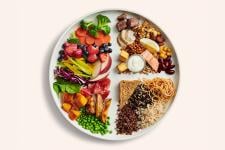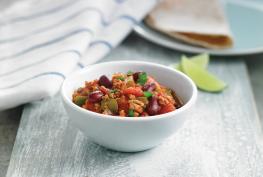Protein foods, including plant-based protein foods, are an important part of healthy eating. Include foods such as beans, lentils, nuts, seeds, lean meats and poultry, fish, shellfish, eggs, lower fat milk and lower fat dairy products.
On this page
Protein foods are good for you
You can eat a variety of protein foods as part of a healthy eating pattern.
Protein foods have important nutrients such as:
- protein
- vitamins
- minerals
Try to choose protein foods that come from plants every day. Plant-based protein foods can provide more fibre and less saturated fat than other types of protein foods. This can be beneficial for your heart health.
You don’t need to eat large amounts of protein foods to meet your nutritional needs. Try to eat protein foods such as:
- eggs
- lean meats and poultry
- lean cuts of beef, pork and wild game
- turkey
- chicken
- nuts and seeds
- peanuts
- almonds
- cashews
- nut butters
- sunflower seeds
- fish and shellfish
- trout
- perch
- shrimp
- salmon
- pickerel
- sardines
- mackerel
- lower fat dairy products
- milk
- yogurt
- lower sodium cheeses
- beans, peas and lentils
- brown, green or red or other lentils
- peas such as chickpeas and split peas
- dried beans such as black beans and kidney beans
- fortified soy beverages, tofu, soybeans and other soy products
Tips for vegetarians
Get the nutrients you need by:
- following Canada's food guide plate
- choosing a variety of protein foods, including eggs and lower fat dairy products
If you eat only plant-based foods, choose a variety of healthy foods from Canada's food guide. Include foods and beverages fortified with vitamin B12 because vitamin B12 is only found naturally in animal-based foods.
Choosing and preparing healthy protein foods
There are many different types of protein foods to choose. Make healthier choices.
Beans, peas and lentils
Choose:
- dried beans, peas and lentils to soak and cook at home
- low sodium canned beans, peas and lentils, or rinse and drain them to reduce the amount of sodium
Nuts and seeds
Choose:
- dry roasted nuts and seeds without added:
- sugars
- fat (oils)
- sodium (salt)
- peanut butter or other nut butters that list peanuts or nuts as the only ingredient. Choose ones with little to no added:
- sodium
- sugars
- saturated fat
Fish and shellfish
Choose:
- canned fish with little to no added sodium
- fresh or frozen fish and shellfish that has not been:
- breaded
- battered
- deep-fried
Lean meats
Choose:
- skinless poultry
- lean cuts of meat such as round and loin
- fresh or frozen meat and poultry without rich sauces
- meat prepared with little or no added sodium or saturated fat
Milk and dairy products
Choose:
- unsweetened lower fat milk
- unsweetened lower fat yogurt
- lower fat, lower sodium cheeses
Soy products and fortified soy beverages
Choose:
- unsweetened fortified soy beverages
- lower sodium soy products, such as tofu and edamame
Preparing protein foods
Try healthier ways to prepare your food by:
- draining off extra fat after cooking
- trimming the visible fat from meats
- removing skin from poultry before cooking
- limiting the amount of sauces, butter or gravy
Try cooking methods that use little or no added saturated fat. These include methods such as:
- baking
- grilling
- roasting
- poaching
Enhance the flavour by:
- seasoning with herbs, lemon or salsas
- using small amounts of oils with healthy fats such as olive and canola
Snack ideas
Protein foods make healthy and delicious snacks. Try these quick and tasty options:
- nuts and seeds
- hard-boiled eggs
- oven roasted chickpeas
- hummus with fresh veggies
- peanut butter on celery sticks
- lower fat yogurt with fresh fruit
How to eat more protein foods that come from plants
Try replacing some meat or poultry with plant-based protein foods. As your main course, try using:
- beans in a burrito
- tofu in a vegetable stir-fry
- chickpeas and beans in tacos
- lentils in a soup, stew or casserole
Many simulated meat products are highly processed and can add excess sodium or saturated fat to your diet. Use food labels to make a healthy choice.
Make a healthy choice
What you eat on a regular basis matters for your health.
- Choose foods that have little to no added sodium, sugars or saturated fat.
- Compare the nutrition facts table on foods to choose products that are lower in sodium, sugars or saturated fat.
- Date modified:


